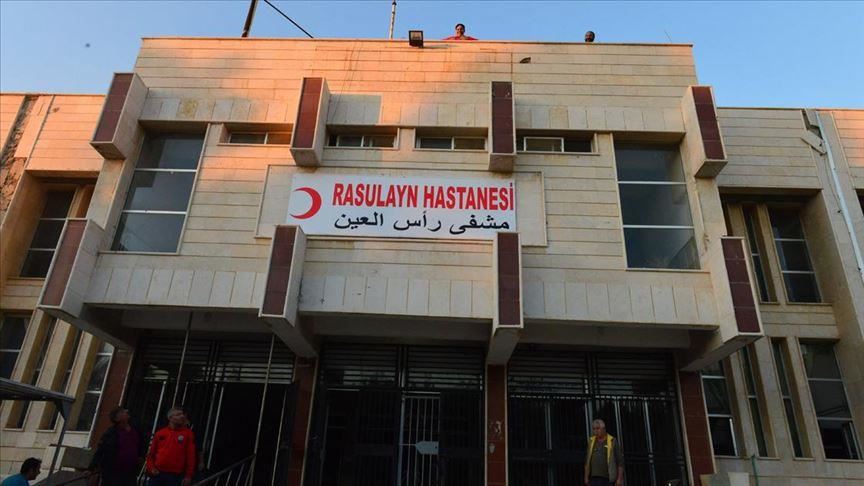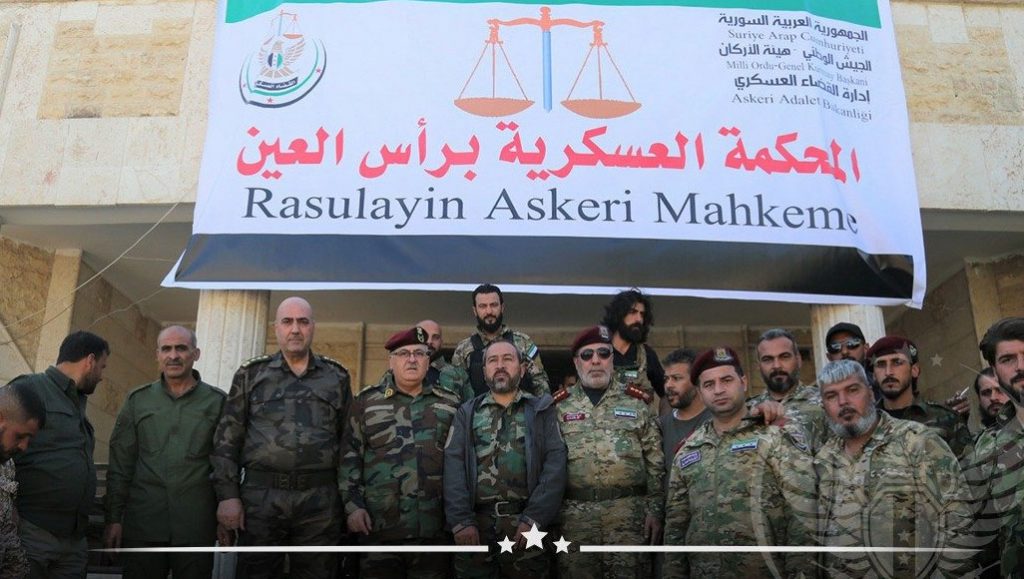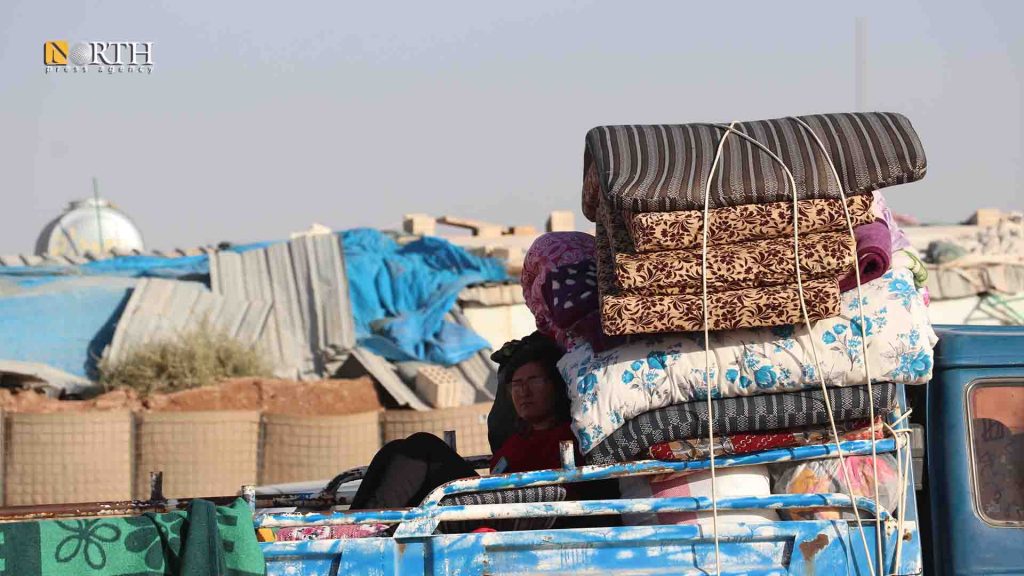HASAKAH, Syria (North Press) – Less than 15% of Sere Kaniye (Ras al-Ain) residents returned to their houses after Turkey and Turkish-backed armed Syrian factions had took control over the area, according to a recent report released by Synergy Association for the Victims of the Turkish Invasion of Northeast Syria.
Today, October 9, marks the second anniversary of the Turkish invasion on the cities of Sere Kaniye (Ras al-Ain) and Tel Abyad, northeast Syria, through a broad-scale military operation called “Peace Spring.”
As a result of the Turkish “Peace Spring” operation, about 300,000 people fled their houses including about 175,000 people from the area extends between Sere Kaniye and Tel Abyad, where Turkish Presidents claimed to establish the “Safe Zone,” according to human rights reports.
According to North Press’ exclusive sources from the Kurdish-majority Sere Kaniye, only about 50 Kurdish people are left in the area with most of them of old people.
As for Yezidi people, who were about 600 people distributed to 16 villages and the city, they are no more existed in the area after the Turkish invasion.
Meanwhile, there are only 14 Christians in the city, according to the same sources.
Following nine days of fighting with the Syrian Democratic Forces (SDF) before announcing their readiness for withdrawal from Sere Kaniye according to an American-Russian-brokered ceasefire with Turkey, the Turkish forces took control over the two cities and the border strip with more than 80 km long and 30 km deep.
Before conducting the “Peace Spring” and when Turkey threatened to launch the military operation, residents of the region organized protests and demonstrations on the border near Sere Kaniye city refusing any external attack.
In mid-August of 2019, the SDF began filling the defensive tunnels, which they prepared due to the Turkish threats, in the area between Sere Kaniye and Tel Abyad within the framework of the “security mechanism” according to understandings that took place between the US and Turkey.
The understandings stipulated that SDF withdraw its forces and heavy weapons from border posts with Turkey, with 5 km depth and 14 km long, in addition to having the area run by local military councils.
After filling the tunnels and despite the US reassurances to the local military councils to protect civilians against any Turkish invasion, Washington, in a surprising step, announced the withdrawal of its forces from military bases and posts on the border on October 7, 2019 in a step that was described at the time by the SDF, saying, “US troops did not comply with its duties.”
The US withdrawal came after an announcement by the Turkish President, Recep Tayyip Erdogan that his country will conduct an air and ground operation east of the Euphrates in Syria, within the context of the next few days or hours.
At about 04:00 pm on October 9, 2019, Turkish airstrikes began in conjunction with artillery shelling on Sere Kaniye and then the city of Tel Abyad along with the border strip between the two cities leading to a displacement wave towards the cities of Hasakah, Raqqa, and their villages.
Turkification
Days after the military operation ended, the Turkish forces raised their flags over official facilities and departments within the two cities, as they are stilled raised there.

However, all signs on civilian institutions and vital and educational facilities which were written in three languages that the residents of the area speak including Arabic, Kurdish, and Syriac during Autonomous Administration of North East Syria period, have been Turkified, according to photos, which North Press obtained copies of, released by media outlets close to Ankara.
In a clear Turkish expansion in northeastern Syria, the Turkish state of Şanlıurfa is currently overseeing the service and administrative aspects of Sere Kaniye and Tel Abyad.
The Turkish authorities have also ideologized school curricula and adopted the Turkish language as one of the main subjects within schools.
Demographic change
“Turkey clearly made a demographic change in the area in coordination with the armed factions, similar to what it did in Afrin, where it looted the possessions of the residents fled, and settled instead of them, people of other Syrian areas,” Ezzedin al-Saleh, CEO of Synergy told North Press.
The Synergy Association includes a group of journalists, jurists, and researchers from Sere Kaniye, and is documenting violations in Sere Kaniye and its countryside.
According to al-Saleh, and since their invasion, the Turkish forces have “settled more than 2,000 displaced families from other Syrian regions in the homes of the IDPs, in addition to settling more than 55 women and children of ISIS fighters (mostly Iraqis) in the seized homes in Sere Kaniye.”
“Turkey also seized more than 5,500 houses and more than 1,200 commercial and industrial stores, in addition to emptying 55 villages of their indigenous inhabitants,” he added.
The IDPs refuse to return to their homes under the Turkish control, for fear of arrest and killing, despite the Turkish authorities’ attempts, through the Turkish-based Syrian National Coalition (SNC), to work on their return.
“What has been documented is just a small part of the broad and systematic violations that are committed in Sere Kaniye and Tel Abyad, due to harassment and restricting the media work to only those close to them,” he added.
Countless violations
Despite Turkey’s allegations about turning the two cities into safe zones, reports received everyday uncover the volume of the violations and insecurity.
Since Turkey’s control over the two cities, 56 bombings have been taken place at least, killing more than 135 civilians, including women and children, in addition to more than 300 wounded, the Synergy Association noted.
The association also documented 48 cases of killing of civilians, including three women, in addition to the killing of 11 people “who were liquidated on the ground by Turkish forces and opposition factions.”
While the area witnessed 386 arrests, including 48 women and 12 children, in addition to 152 people who were forcibly disappeared.
Prisons in those areas constitute a “nightmare” for the locals, as over two years, about 232 cases of torture were recorded inside prisons (at least three people died under torture).

Perhaps the most prominent issues condemned by international organizations such as Human Rights Watch (HRW) is the transfer of Turkish forces to dozens of people from Syria to Turkey.
In a report published in February, 2021, the HRW said that “Turkey and its affiliated Syrian National Army (SNA) have illegally arrested and transferred at least 63 Syrians from northeast Syria to Turkey to be trialed on serious charges that may lead to life imprisonment.
“As an occupying force, the Turkish authorities are supposed to respect the people’s rights under the law of occupation in northeast Syria, including the prohibition of arbitrary detention and transfer of people to their territory,” said Michael Page, deputy director in the Middle East and North Africa division at Human Rights Watch.
“Turkey, however, has been violating its obligations by arresting these Syrians and taking them to Turkey to face questionable and extremely obscure charges related to their alleged activity in Syria,” he added at the time.
Telling North Press, the official spokesman for the Syrian Democratic Forces (SDF), Aram Hanna, previously said that Turkey sentenced three SDF members, who were arrested in late 2019, to life imprisonment after forcing them to sign papers in Turkish in court without translating them into Arabic.
Article 49 of the Fourth Geneva Convention states, “Individual or mass forcible transfers, as well as deportations of protected persons from occupied territory to the territory of the Occupying Power or to that of any other country, occupied or not, are prohibited, regardless of their motive.”
Seizing possessions
In addition to the ongoing security chaos, the Sere Kaniye and Tel Abyad areas are witnessing high cost of living, amid deteriorating services.
Families in those areas are scavenging through garbage in search of metal scraps to sell in light of the lack of job opportunities and a sharp rise in the prices of basic commodities, informed sources told North press.
The price of a 10-loaf-bread sack in the two regions reaches 2,000 SYP, while a liter of diesel has reached more than 2,100 SYP, and a gas bottle is sold at 60,000 SYP (about $17) in the black markets.
With the migration of the indigenous population, the Turkish forces, alongside the armed opposition factions, unlawfully seized public and private property in the two areas, under the pretext of their owners’ dealing with the SDF.
In addition to converting some houses into institutes for teaching Islamic law in Sere Kaniye, more than one and a half million acres (150,000 hectares) of agricultural land were seized, according to North Press special sources.
The Turkish forces and the opposition factions seized the silos in (Ras al-Ain, Tel Halaf, al-Alia, al-Safh, Mabrouka, al-Manajir, Dehliz and Sukherat), and the crops of farmers after their control of the area, according to the same sources.
Resurgence of ISIS
In light of the foregoing, and in a remarkable development, the banners of the Islamic State (ISIS) were raised in the center of Sere Kaniye while protesting against the French president’s attitude toward cartoons of the Prophet Muhammad in October 2020.
Activists circulated videos from Sere Kaniye showing the opposition militants in al-Joza Roundabout in the center of the city, raising ISIS flag and chanting jihadist songs.
Dozens of ISIS insurgents are present in the Turkish forces-held areas in northeast Syria, specifically in the town of Suluk in Tel Abyad countryside, informed sources told North Press.
Accusing of serious violation of human rights, including kidnappings and torture, Ahrar al-Sharqiya faction and two of its leaders were put on the list of sanctions imposed by the US Treasury in late July.
Ahrar al-Sharqiya faction, which is close to Turkey, is one of the largest armed factions and the most perpetrators of crimes. It operates in Turkey-held areas in northeast and northwest Syria.
The US Treasury said that Ahrar al-Sharqiya faction has killed hundreds of others since 2018 in a prison under its control near Aleppo, and has enlisted former ISIS militants into its ranks.
In a statement, the US State Department indicated that Ahrar al-Sharqiya involved in the killing of the Kurdish politician, Hevrin Khalaf, in October 2019. And its militants were responsible for looting private property of civilians. It also prevented displaced Syrians from returning to their homes.

